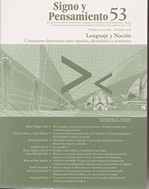Abstract
This is a politic communicational study about the Chilean senatorial discourse. We formulate that the traditional nation conceptual framework has a concretion as an ideology, and it is avoiding a democratic grow in the Republic of Chile because it is used, by the conservative sector, as the main argumentation against the main indigenous population in Chile: Mapuche people. We use the ideological discourse analysis to observe the conservative parliamentary debate referred to Mapuche people. This study reveals that the traditional nation principles are present on this discourse even in its pure form and it is continuously used against political aspirations of Mapuche people, which is frequently mixed with racism ideology. We finish by discussing about additional studies that would complement this and we generate some hypothetical political scenarios that, considering this political situation, would improve the democracy building process in Chile.This journal is registered under a Creative Commons Attribution 4.0 International Public License. Thus, this work may be reproduced, distributed, and publicly shared in digital format, as long as the names of the authors and Pontificia Universidad Javeriana are acknowledged. Others are allowed to quote, adapt, transform, auto-archive, republish, and create based on this material, for any purpose (even commercial ones), provided the authorship is duly acknowledged, a link to the original work is provided, and it is specified if changes have been made. Pontificia Universidad Javeriana does not hold the rights of published works and the authors are solely responsible for the contents of their works; they keep the moral, intellectual, privacy, and publicity rights.
Approving the intervention of the work (review, copy-editing, translation, layout) and the following outreach, are granted through an use license and not through an assignment of rights. This means the journal and Pontificia Universidad Javeriana cannot be held responsible for any ethical malpractice by the authors. As a consequence of the protection granted by the use license, the journal is not required to publish recantations or modify information already published, unless the errata stems from the editorial management process. Publishing contents in this journal does not generate royalties for contributors.


